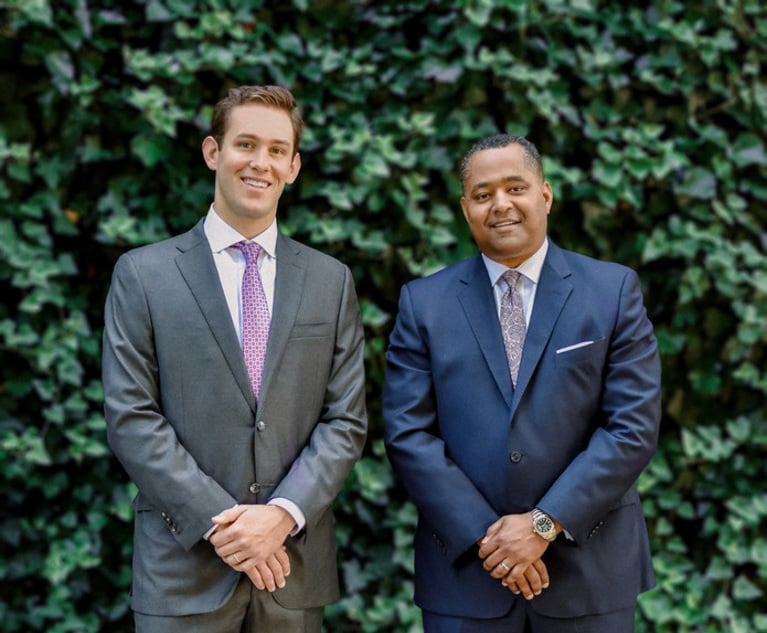 Emma M. Hetherington, assistant clinical professor and the director of the Wilbanks Child Endangerment and Sexual Exploitation (CEASE) Clinic with University of Georgia School of Law. (Courtesy photo)
Emma M. Hetherington, assistant clinical professor and the director of the Wilbanks Child Endangerment and Sexual Exploitation (CEASE) Clinic with University of Georgia School of Law. (Courtesy photo)Could Jeffrey Epstein Be Sued Under Georgia Law?
“We've talked to people when we know that the statute of limitations has run, but we don't stop them from telling their story,” said Emma M. Hetherington, director of the University of Georgia School of Law's Wilbanks Child Endangerment and Sexual Exploitation Clinic.
July 15, 2019 at 11:00 AM
4 minute read
Beyond the new federal criminal sex-trafficking case against wealthy financier Jeffrey Epstein, civil actions are pending against him in Florida and New York by women who say he abused and raped them when they were young teenagers, some 15 to 20 years ago.
If the same alleged crimes took place in Georgia, could anyone sue him?
No, according to Emma M. Hetherington, director of the University of Georgia School of Law's Wilbanks Child Endangerment and Sexual Exploitation Clinic. “Unless the crimes took place after July 1, 2015, or the victims are currently under 23.”
Georgia temporarily suspended its statute of limitations for adult survivors of childhood sexual abuse, but that window has now closed. Efforts have been made and failed in the Legislature to follow some other states in lengthening or abolishing the statute of limitations for child sexual abuse.
And survivors of childhood sexual abuse often don't disclose the crimes until midlife, often when they have children of their own, Hetherington said.
In addition, Georgia law protects institutions—scouting organizations, churches, schools, all of which have been accused of protecting sexual predators and have successfully lobbied the Legislature to shield them from liability. So only individuals can be sued, and most don't have assets to pay damages, restitution and the cost of therapeutic services it takes to allow many victims to grow strong enough to stand up to abusers, Hetherington said.
Georgia law does allow civil actions against someone, like Epstein, with assets—reportedly airplanes and mansions in New York, Palm Beach, France and the Caribbean—in theory. But the statute of limitations blocks most cases, Hetherington said.
Opponents of modifying the statute of limitations express fears of a flood of lawsuits that could bankrupt organizations. But the law clinic filed only about half a dozen complaints even during the two-year open window. One of those was withdrawn voluntarily. One went to trial and ended in a modest judgment. The others were settled confidentially. The clinic has worked with 78 survivors since it opened in 2016 and currently has five open cases, according to Hetherington.
“They don't come in here saying, 'This is about money,'” Hetherington said. “They come in here saying, 'I want to get back what was taken from me.' They overwhelmingly want to use the judicial system to say in a public forum that they were abused, this happened, and it was wrong.”
Most of the people who come to the clinic for help are not going to be able to sue, she said. The clinic lawyers and staff listen to them anyway.
“We've talked to people when we know that the statute of limitations has run, but we don't stop them from telling their story,” Hetherington said. “We listen. … We get the full story.”
The clinic also partners with the UGA School of Social Work.
“We try to find referrals that might help them,” she said. That might include legal aid, therapeutic services or other resources.
“Sometimes we can't take cases. But we leave them with something in their hands to hold and know someone believes them,” Hetherington said.
Part of the clinic's mission is to provide resources for survivors and attorneys seeking justice. The clinic is conducting research on barriers to accessing justice for survivors of child sexual abuse, and best practices for trauma-informed and holistic representation.
Besides listening respectfully and affirming the courage it takes to speak out about the unspeakable, Hetherington has one more bit of advice for lawyers and others who hear the kinds of stories being told now by adults who say they were abused as children and teens.
“We always say thank you to people for telling us. It means a lot to us that they trust us enough to tell us,” Hetherington said. “It's truly an honor.”
This content has been archived. It is available through our partners, LexisNexis® and Bloomberg Law.
To view this content, please continue to their sites.
Not a Lexis Subscriber?
Subscribe Now
Not a Bloomberg Law Subscriber?
Subscribe Now
NOT FOR REPRINT
© 2024 ALM Global, LLC, All Rights Reserved. Request academic re-use from www.copyright.com. All other uses, submit a request to [email protected]. For more information visit Asset & Logo Licensing.
You Might Like
View All
Atlanta Attorneys Rely on Google Earth, YouTube for Evidence in $6M Faulty Guardrail Settlement

Troutman, Womble Bond Mergers This Year Created New Am Law 100 Firms
5 minute read
As Atlanta Partners Moved to Am Law 200 Firms at a Higher Rate in 2024, 2 New Arrivals Benefited
6 minute readTrending Stories
- 1Call for Nominations: Elite Trial Lawyers 2025
- 2Senate Judiciary Dems Release Report on Supreme Court Ethics
- 3Senate Confirms Last 2 of Biden's California Judicial Nominees
- 4Morrison & Foerster Doles Out Year-End and Special Bonuses, Raises Base Compensation for Associates
- 5Tom Girardi to Surrender to Federal Authorities on Jan. 7
Who Got The Work
Michael G. Bongiorno, Andrew Scott Dulberg and Elizabeth E. Driscoll from Wilmer Cutler Pickering Hale and Dorr have stepped in to represent Symbotic Inc., an A.I.-enabled technology platform that focuses on increasing supply chain efficiency, and other defendants in a pending shareholder derivative lawsuit. The case, filed Oct. 2 in Massachusetts District Court by the Brown Law Firm on behalf of Stephen Austen, accuses certain officers and directors of misleading investors in regard to Symbotic's potential for margin growth by failing to disclose that the company was not equipped to timely deploy its systems or manage expenses through project delays. The case, assigned to U.S. District Judge Nathaniel M. Gorton, is 1:24-cv-12522, Austen v. Cohen et al.
Who Got The Work
Edmund Polubinski and Marie Killmond of Davis Polk & Wardwell have entered appearances for data platform software development company MongoDB and other defendants in a pending shareholder derivative lawsuit. The action, filed Oct. 7 in New York Southern District Court by the Brown Law Firm, accuses the company's directors and/or officers of falsely expressing confidence in the company’s restructuring of its sales incentive plan and downplaying the severity of decreases in its upfront commitments. The case is 1:24-cv-07594, Roy v. Ittycheria et al.
Who Got The Work
Amy O. Bruchs and Kurt F. Ellison of Michael Best & Friedrich have entered appearances for Epic Systems Corp. in a pending employment discrimination lawsuit. The suit was filed Sept. 7 in Wisconsin Western District Court by Levine Eisberner LLC and Siri & Glimstad on behalf of a project manager who claims that he was wrongfully terminated after applying for a religious exemption to the defendant's COVID-19 vaccine mandate. The case, assigned to U.S. Magistrate Judge Anita Marie Boor, is 3:24-cv-00630, Secker, Nathan v. Epic Systems Corporation.
Who Got The Work
David X. Sullivan, Thomas J. Finn and Gregory A. Hall from McCarter & English have entered appearances for Sunrun Installation Services in a pending civil rights lawsuit. The complaint was filed Sept. 4 in Connecticut District Court by attorney Robert M. Berke on behalf of former employee George Edward Steins, who was arrested and charged with employing an unregistered home improvement salesperson. The complaint alleges that had Sunrun informed the Connecticut Department of Consumer Protection that the plaintiff's employment had ended in 2017 and that he no longer held Sunrun's home improvement contractor license, he would not have been hit with charges, which were dismissed in May 2024. The case, assigned to U.S. District Judge Jeffrey A. Meyer, is 3:24-cv-01423, Steins v. Sunrun, Inc. et al.
Who Got The Work
Greenberg Traurig shareholder Joshua L. Raskin has entered an appearance for boohoo.com UK Ltd. in a pending patent infringement lawsuit. The suit, filed Sept. 3 in Texas Eastern District Court by Rozier Hardt McDonough on behalf of Alto Dynamics, asserts five patents related to an online shopping platform. The case, assigned to U.S. District Judge Rodney Gilstrap, is 2:24-cv-00719, Alto Dynamics, LLC v. boohoo.com UK Limited.
Featured Firms
Law Offices of Gary Martin Hays & Associates, P.C.
(470) 294-1674
Law Offices of Mark E. Salomone
(857) 444-6468
Smith & Hassler
(713) 739-1250







